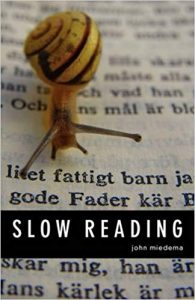Slow Reading
Author: John Miedema
Price: $12.00
Published: March 2009
ISBN: 978-0-9802004-4-7
92 pages
Praise for Slow Reading:
“Readers make choices in the kinds of attention they give to texts–from scanning, skimming and speed reading to deep reading and rereading. In Slow Reading, John Miedema draws on both his personal reading experience and the extensive research literature on reading to make a powerful case for the deep pleasures of engaged, reflective reading.”
– Catherine L Ross, professor, Faculty of Information & Media Studies, University of Western Ontario
“A little book likely to make a large impact. Slow Reading challenges our notions of what it means to be a reader in an ever more complex information world.”
– Lynne McKechnie, professor, Faculty of Information & Media Studies, University of Western Ontario
“Slow Reading is a reflective look at what it means to simply read in a fast-paced digital age. John Miedema takes us through the psychology, practice and personal nature of slow reading and gives us some background on the more general slow movement. Writing worth reading, and worth reading well.”
– Jessamyn West, founder, librarian.net
In the face of ever-increasing demands for speed-reading of volumes of information fragments, some readers are choosing to slow down. While it often seems necessary to read quickly, many readers share a conviction that reading slowly is essential to enjoyment and comprehension.
The involuntary practice of slow reading has been a subject of much research, but little is known about the voluntary practice. Slow Reading examines the research, from the earliest references in religion and philosophy, to the practice of close reading in the humanities, and the recent swell of interest associated with the Slow Movement. It looks at the diverse angles from which slow reading has been approached in education, library sciences and media studies. Research in psychology and neurophysiology provides a tentative explanation for the ongoing role of slow reading.
Slow Reading brings attention to emerging ideas in technology and culture. The traditional technologies of print and the book have persisted as part of our information ecology because of the need for slow reading and deep comprehension. The theme of locality in the Slow Movement provides insight into the importance of physical location in our relationship with information. Most of all, Slow Reading represents a rediscovery of the pleasure of reading for its own sake.
Read Chapter 2 of Slow Reading: “Slow Reading in an Information Ecology.”
